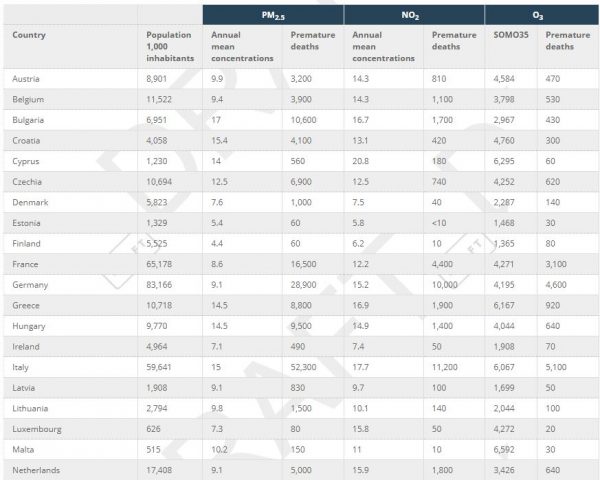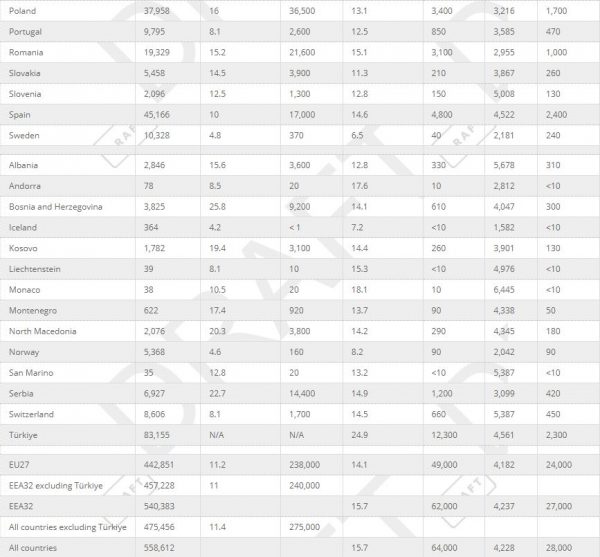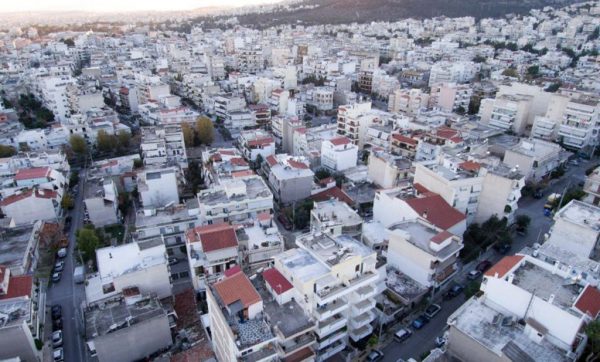
Air pollution was responsible for the death of 11,620 citizens in Greece in 2020. And it is the high concentrations of fine suspended particles with a diameter below 2.5 μm (fine particulate matter – PM 2.5), nitrogen dioxide (NO2) and ozone ( O3) that are to blame for all these deaths, according to what European Environment Agency (EEA) scientists noted in their report on “Air Quality in Europe” published today Thursday.
Air pollution is the biggest environmental risk to public health in Europe. And while the levels of air pollutants in the atmosphere have been reduced over the past two decades in the 33 European countries that the EEA controls (EU-27 and six other European states), air quality remains poor in many areas of the continent. According to the new report, 96% of the urban population in Europe is exposed to PM2.5 concentrations, well above the tolerable levels of 5 µg/m3 set by the World Health Organization (WHO) in 2021. In fact, the data presented in the report show that the exposure of the population to these specific pollutants resulted in 238,000 premature deaths being recorded in the EU-27 in 2020. Air pollution also causes morbidity, which entails significant health care costs.
In any case, the new data shows that the EU’s Zero Pollution Action Plan, which aims to reduce the number of premature deaths due to exposure to fine particles by 55% by 2030, compared to 2005. It is characteristic that in 2020, premature deaths attributable to particulate pollution fell by 45% in the EU-27, compared to 2005. However, as European experts note, further efforts will be needed to reduce air pollution to levels which are not considered harmful to public health.
PM2.5 is mainly emitted by fuels used for domestic heating, industrial activities and road transport. But also agricultural emissions of ammonia contribute significantly to the formation of particles in the atmosphere. Concentrations above the WHO annual guideline of 5 µg/m3 were observed in all European countries studied in the report, with the exception of Estonia. In addition, in all 33 countries concentrations above the WHO daily guideline of 15 μg/m3 were recorded.
As for nitrogen dioxide (NO2) concentrations in 2020, they temporarily decreased as a direct result of reductions in road transport during the restrictions due to COVID-19, mainly in large cities in France, Italy and Spain. However, the highest concentrations of particulates and benzo[a]pyrene (a carcinogen) are reported in Central and Eastern Europe and Italy, mainly due to the burning of solid fuels for domestic heating and its use in industry. Ozone levels were lower than in previous years, but still high in Central Europe and some Mediterranean countries, including Greece. 

Health effects
In 2020, air pollution led to a significant number of premature deaths in the 27 EU Member States. Exposure to concentrations of fine particles above the World Health Organization guideline resulted in 238,000 premature deaths. Nitrogen dioxide exposure above the corresponding guideline level led to 49,000 premature deaths while corresponding ozone exposure caused 24,000 premature deaths.
But in addition to premature deaths, air pollution also causes morbidity. In 2019, people’s exposure to PM2.5 led to 175,702 years lived with disability (YLDs) due to chronic obstructive pulmonary disease in 30 European countries (Greece ranks 15th with 35.5 years lived with disability per 100,000 inhabitants). At the same time, NO2 exposure led to 175,070 YLDs due to diabetes mellitus (also known as type 2 diabetes) in 31 European countries. In the same year, 12,253 people in 23 European countries were admitted to hospital with lower respiratory tract infections due to acute ozone exposure.
The highest absolute burden from diabetes insipidus was observed in Turkey, with 54,186 YLDs. The lowest was in Iceland with 18 YLD. Relative to population, the highest rates were observed in Turkey (146 YLD per 100,000 inhabitants), Cyprus (76 YLD per 100,000 inhabitants) and Greece (61 YLD per 100,000 inhabitants). The lowest rates were observed in Estonia, Sweden and Denmark.
As for ecosystems, the EU action plan aims to reduce by 25% by 2030 the percentage of them affected by air pollution, compared to 2005. In 2020, harmful levels of nitrogen deposition in ecosystems exceeded the limits to 75% of the total area of ecosystems in the EU-27. This represents a 12% drop from 2005.
Latest News

Economist: Greece Included in the Best Performing Economies in 2024
Meanwhile, Northern European countries disappoint, with sluggish performances from the United Kingdom and Germany.

EasyJet Expands Its Routes from Athens
The airline’s two new routes will be to London Luton and Alicante and they will commence in summer 2025.

Capital Link Forum Highlights Greece’s Economic Resurgence; Honors BoG Gov Stournaras
Capital Link Hellenic Leadership Award recipient, Bank of Greece Gov. Yannis Stournaras, an ex-FinMin, was lauded for his pivotal role during Greece’s economic recovery

Tourist Spending in Greece Up by 14%, Visa Card Analysis Shows
Greece’s capital Athens emerged as the most popular destination, recording a 17% increase in transactions with Visa cards, surpassing even the cosmopolitan island of Mykonos.

Inflation in Greece Unchanged at 2.4% in Nov. 2024
The general consumer price index (CPI) posted a 0.4% decrease in November compared to the previous month

2024 Christmas Holidays: Extended Shop Hours Schedule
The 2024 Christmas Holidays extended shop hours schedule commences on Thursday, December 12 and runs until the end of the year.

ELSTAT: Seasonally Adjusted Unemployment Down in October
The number of employed individuals reached 4,284,694, an increase of 67,723 compared to October 2023 (+1.6%) and 22,002 compared to September 2024 (+0.5%).

Greek PM’s Chief Economic Adviser Resigns
In the post on his Facebook page, Patelis did not disclose the reasons that led him to step down.

“Masdar Invests in the people of Greece and in the vision of TERNA ENERGY”
Four messages from the CEO of Masdar, the Arab renewable energy giant, after its acquisition of 70% of TERNA ENERGY

Lloyd’s List Greek Shipping Awards 2024: Honors for leading companies and personalities in the Greek shipping sector
20 awards presented at the 21st annual Lloyd's List Greek Shipping Awards

















![Χειμερινή εξοχική κατοικία: Οι Ελληνες γυρνούν την πλάτη παρά την πτώση των τιμών [γραφήματα]](https://www.ot.gr/wp-content/uploads/2024/12/Capture-19-90x90.jpg)
























 Αριθμός Πιστοποίησης Μ.Η.Τ.232433
Αριθμός Πιστοποίησης Μ.Η.Τ.232433